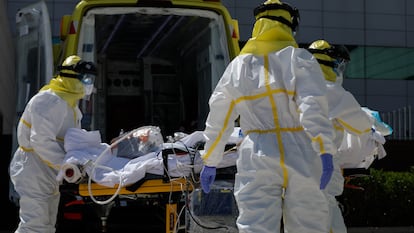Spain records lowest rate of coronavirus contagion since declaration of state of alarm
The number of fatalities fell to 301, while new infections dropped to 1,308, a figure not seen since March 14

The number of daily coronavirus deaths registered in Spain was 301 on Tuesday, according to the latest figures provided by the Health Ministry. This is a slight fall from Monday, when the number of overnight fatalities was 331.
In recent weeks, an uptick in the numbers has come to be expected on Tuesdays, given that figures tend to be underreported on weekends due to the lack of personnel. But this was not the case today.
What’s more, there was also a fall in the number of new infections. On Tuesday, there were 1,308 new infections, compared to yesterday’s figure of 1,831, which represents a 0.6% rise of the total. This is the lowest figure recorded, in both absolute and relative terms, since the declaration of the state of alarm on March 14.
The number of cases is falling very quickly, as we expectedFernando Simón, the director of the Health Ministry’s Coordination Center for Health Alerts
The number of new infections only represents coronavirus cases that have been confirmed via PCR tests, which identify people with an active infection at the time of testing. Since Sunday, the government has only reported infections confirmed via this method, and not serological tests, which measure antibodies in the blood. Up until two weeks ago, new cases were only being measured with PCR tests.
But even when compared to previous PCR results, today’s number of new cases is still the lowest in a month and a half.
The total number of infections confirmed via PCR tests is 210,773. If serological tests are counted, that figure is 232,128.
The total death toll since the beginning of the pandemic is 23,822. Health authorities also reported that a total of 102,548 patients have recovered and been discharged from hospital, a daily rise of 1,673.
Speaking at the government’s daily conference on Tuesday, Fernando Simón, the director of the Health Ministry’s Coordination Center for Health Alerts, said the figures were “very positive.” “The number of cases is falling very quickly, as we expected,” he added.
After reaching a peak of 950 fatalities on April 2, the number of daily coronavirus-related deaths began a slow descent. The figures last week remained stable with 288 on Sunday, 378 on Saturday, 367 on Friday, 440 on Thursday and 435 on Wednesday.
OECD ranking error
The Spanish Health Ministry claimed on Monday that Spain had been ranked eighth on the Organisation for Economic Co-operation and Development’s (OECD) list of top 10 countries for coronavirus testing. According to this list, Spain had done more diagnostic tests per inhabitant than Germany.
We just updated our data on Diagnostic Testing for COVID-19, revealing significant scaling up of efforts in many @OECD countries. Good to see Spain among top10 testing countries. Increasing testing capacity is crucial for deconfinement strategies &to reduce risks of new outbreaks pic.twitter.com/l8TEkkZDSd
— José Ángel Gurría (@A_Gurria) April 27, 2020
On Monday, Angel Gurría, the secretary general of the OECD, shared the list on Twitter, and shortly afterwards, the Spanish Health Ministry, retweeted the post with the message: “Spain is among the top 10 OECD countries in terms of diagnostic tests.”
But the figures used to reach this conclusion come from different sources and are not entirely comparable.
For this statistic, Spain provided both the number of PCR tests, which are the most reliable, and fast tests, which detect antibodies in the blood, whereas Germany only counted PCR tests.
English version by Melissa Kitson.
Tu suscripción se está usando en otro dispositivo
¿Quieres añadir otro usuario a tu suscripción?
Si continúas leyendo en este dispositivo, no se podrá leer en el otro.
FlechaTu suscripción se está usando en otro dispositivo y solo puedes acceder a EL PAÍS desde un dispositivo a la vez.
Si quieres compartir tu cuenta, cambia tu suscripción a la modalidad Premium, así podrás añadir otro usuario. Cada uno accederá con su propia cuenta de email, lo que os permitirá personalizar vuestra experiencia en EL PAÍS.
¿Tienes una suscripción de empresa? Accede aquí para contratar más cuentas.
En el caso de no saber quién está usando tu cuenta, te recomendamos cambiar tu contraseña aquí.
Si decides continuar compartiendo tu cuenta, este mensaje se mostrará en tu dispositivo y en el de la otra persona que está usando tu cuenta de forma indefinida, afectando a tu experiencia de lectura. Puedes consultar aquí los términos y condiciones de la suscripción digital.









































